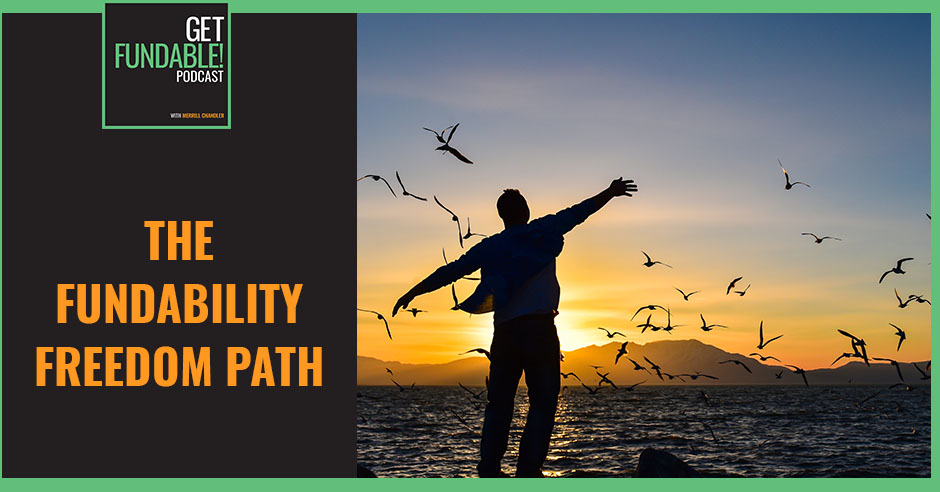
It is so easy to think about freedom in the context of being able to do whatever we want. However, it is so much more than that. Merrill Chandler breaks the truth to us about what it takes to create freedom, particularly the freedom to masterfully create anything you want. He goes philosophical and talks about its relation to building up that competence and confidence and learning to express ourselves with the best of our abilities to be fully free to enjoy the results of our labor. Get inside this great episode to learn how you can start creating freedom for yourself while being masterful about your practice, including your fundability™ game.
—
Watch the episode here:
Listen to the podcast here:
The Fundability™ Freedom Path
I’ve got a great discussion for us. We’re going to be talking about mastery and freedom from the rote and daily BS of our lives and how to create that freedom.
I’ve been waiting for the right moment to be able to have this episode. First of all, we’re talking about freedom. This is not the Braveheart, the political, or democratic version of freedom. I’m talking about the freedom to create anything you want masterfully. Let me break it down.
Practice Creates Competence Creates Confidence Creates Mastery Creates Freedom
I have a saying that I love to use when I’m doing my personal development training for people when I’m in my deeper fundability™ classes, the masterminds, etc. It goes like this, “Practice creates competence, confidence, mastery and freedom.” What do I mean by that? When I was eight years old, my mom put me into piano lessons. I was excited to start piano lessons because I could see individuals who got on the keyboard and were playing.
I went to a conservatory. My mom and dad hooked it up. I have nothing against piano teachers in the neighborhood. It was a conservatory. I did my lessons on a baby grand at this conservatory. My teacher was hardcore, demanding, and fastidious. My motivation for these piano lessons at eight years old was so that I could play like a master and free to play anything I wanted. The problem was practice took discipline and as a younger man, I was the most spontaneous and the most out there. Even my gift for gab in talking to people and enrolling them into my life and ideas, even the dark consequences of going to prison because I was out of control.
The seeds of all of those personality traits were alive and kicking when I was eight years old. For years, it was like pulling teeth for my mom to get me to practice. Neither of my mom and dad played the piano but wanted musical children. To this day, my sisters both play. My brother still has a musical bent and me, I only play the stereo and the online services. I don’t play, even though I still have a keyboard in my front room. What’s the point of this? What I didn’t know as an eight-year-old and I didn’t learn for decades later is the process of how practice fits into mastery and freedom.
Practice Creates Competence Creates Confidence Creates Mastery Creates Freedom #GetFundable Share on XWhen I was practicing, I was doing those little keyboard exercises. I was doing my scales and all my things. I was not taught at that age, but I did not make the connection that practice creates competence. If I’m competent at a particular song, we’d have recitals. You may have a similar background to mine. We have recitals to illustrate our competence given a certain level of lessons. The thing I missed is that competence creates confidence. Confidence in every one of us is that juice that makes the squeeze worth it. The confidence to be able to play a song was the feedback loop that would allow me to want to practice more at a whole new level.
We level up and I was good for years. I was playing Für Elise by the time I was ten years old at the recital, but the actual discipline of practicing, the lack of understanding, or the lack of maturity is I could not make that loop. Practice creates competence and confidence. Confidence is the feedback to take us to mastery, where I can master a level of playing.
How To Create Freedom
I’m going to wax a little philosophical here. This process is analogous. It relates to everything that we do. Somebody asked me a long time ago about freedom. I don’t remember what the subject matter was. What I learned from it was more important than the subject, but I retorted, “You love freedom. Are you free to play the piano?” His answer was, “No.” I said, “How free are you?”
In previous episodes, I’ve talked about how many crayons are in a crayon box. Some of us work with 8, 16, 32, 64, or 128 crayons in our box. If I only have eight crayons of the standard colors, am I free to color with seafoam green? No, that’s in the 64-color box. I am not free to color with that color. I am not free to play the piano unless I practice, which creates competence, confidence, and mastery, then I am free to play any song that I wish. There are two versions of freedom. There’s the freedom to do something and freedom from something. What I want this episode to focus on is the ability to be free to do things.
Free to express ourselves, survive a recession, and to qualify for the next home automobile business line of credit. If we have not practiced creating competence, confidence, and mastery over fundability™, we will not be free to enjoy the results of our labors. When I was eleven years old, I wanted to play the rock and roll tunes that I was listening to as a young man. I was born in 1961. I was right smack dab. I was listening to all good burgeoning rock and roll movement at all levels. I was in love with that music. My fascination was I wanted to play on the piano Smoke on the Water by Deep Purple. I wanted to play Stairway To Heaven by Led Zeppelin and Dream On by Aerosmith. I wanted to be able to play these things to impress the fair sex so that I could be the man. All I did was practice the songs and not the theories. I only practiced 2 to 4 songs that I thought would be enough to wow somebody. I was quite the creature as a younger man.

Creating Freedom: Practice creates competence creates confidence creates mastery creates freedom.
If we want freedom, there is a path to freedom. To be free to do something, we have to go through this process. To be free to paint, we’ve got to practice and create competence with the skills and the theory. Those skills and theory turn into personal confidence like, “You nailed it.” We get positive feedback about what we’re able to do. That confidence creates the loop where we can become masters and then we are free to do any art we wish. That mastery doesn’t come until we have dialed in the mechanics and the details and done the rote practice. That is what drove me crazy in most of my life.
When we translate it to the world of fundability™ or anything in the world, the problem is that we want freedom too without paying the price of technical learning and technical expertise. Another example is I’m in the middle of a mastermind. It’s a thing that we’re doing, an eight-week program, where clients get it as part of becoming a coaching program. You can subscribe to it without becoming a client. It’s designed to learn the principles of fundability™ and collect the data to make you personal and business fundable, but it is a pain in the ass. It is fastidious. The lenders measure data points in testily small movements in our borrower behaviors and all of these things. If we don’t go through the BS of collecting all of these little data points, we can never master fundability™.
It’s interesting to watch me as an eight-year-old and my students and the people who are the masterminders, the bootcampers, the funding hackers, to watch them run up against the wall of, “This is tedious.” I’m like, “It’s tedious.” You’ve got to ask yourself, “Is it worth it to be free to be fundable, to take down any kind of credit line, business loan, and of large big-ticket purchase with the best rates, best terms, best everything and do it even during a recession?” Unless we have practiced becoming competent at what appears to be menial tasks, we will never become masters of the funding game. We will not be free to do the things that we say we want to do.
What’s interesting is I can still play 2/3 or 3/4 of Stairway to Heaven because it was the thing that I kept practicing. Many years later, my muscle memory still remembers that song even if I go years without playing it, if we have practiced and created the competence and confidence, we will master Stairway To Heaven. We will master revolving account fundability™. We will master what it takes to thrive in the middle of a personal or global financial distress because you don’t lose your mastery. Mastery means mastery. “Will I play better if I practice Stairway To Heaven?” Yes. It’s funny when I see a piano in a room. We’ve done real estate events or whatever and some wedding had been in one of the rooms prior to the real estate conference being set up. There was a piano there. I sat down at that piano and started tickling with the ivories.
Whether you paint, play the piano, a mechanic fixing cars, creating designs for clothing, there is a period of technical discipline to master the principles. The last thing that I want to cover or review as part of this subject matter is you have seen movies. Maybe you’ve experienced it yourself, where you were listening to somebody who played the piano and it is technically perfect, but it is not artfully expressive. They flawlessly execute the song, but they can’t improvise. Mastery means we can improvise. I always envied people. I had my 3 or 4 songs I could play. I had a friend in high school. He would get on and he could play by ear.
confidence creates the loop where we can become masters and then we are free to do any art we wish. That mastery doesn't come until we have dialed in the mechanics and the details and done the rote practice #GetFundable Share on XI was technical and I couldn’t play by ear. He is my exact same age and he hadn’t taken a lesson in his life. By ear, you could improvise. The thing is that while he was free to improvise music, he couldn’t read music. He would have to listen and that is his limitations. Remember we talked about it, for every new freedom, there’s a new limitation. They come in pairs. He couldn’t read music to get down a piece that he desired to play. He would listen to it and then he would do his estimation of it. As we know, if you’re a music fan or driving a stock car, there is a mastery that comes from practice.
He envied me that I could technically play certain songs. I envied him that he could riff like a madman on many songs. The thing is there are limitations and freedoms to both. When it comes to your life, this isn’t just fundability™. I bring in fundability™ because that’s why you’re here. You want as much juice as you possibly can. That’s why you binge this show. The life lesson here is that whatever we’re doing, we’ve got to practice because only when we become technically capable can we master a song, an instrument, or a wealth strategy and then we are free to create. We have the entire 128-crayon box. We can do anything with those 128 crayons.
The texture, the tones, and the colors are available to us when we’re free to use 128 colors because we’ve practiced shading, the black and white charcoal, and we know the technicality of art, form, shadow, dimension, and perspective. Those are learned by most of us through practice.
Practice, Practice, Practice
The funny thing is Leonardo da Vinci, Michaelangelo, and some of the greats in the Western European Renaissance, we look at their art. They have it all down, but did you realize each one of those were apprentices? They devoted their lives. They apprenticed. They worked for room and board so that they could learn the technical details of the masters. There were some guys who faded into some of their students and into oblivion.

Creating Freedom: If we have not practiced to create competence, create confidence, and create mastery over fundability™, then we will not be free to enjoy the results of our labors.
Raphael, another amazing renaissance, was an apprentice and studied at the feet of Michaelangelo. You have to learn the details. You have to find out what your reporting date. Practice paying down debt to your perfect percentage on the day before the reporting date and to zero on the due date. You have to practice and practice. We become competent because of practice, but we get rewarded when we see our fundability™ and our scores continue to drive higher, and our confidence increases. We then become fundability™ masters. Remember in my book, if you haven’t read my book, I talked about the point of that mastery. We want to master the funding game. To use the sports analogy that I used in The New F* Word, every basketballer out there has practiced and practiced.
You then get Michael Jordan and Kobe Bryant, bless his soul. You get these masters of the game. They are free to do anything on the court and play it masterfully. That’s free because they know every single nuance of the rules of that game. They practiced and practiced. Anybody who’s associated with anything, this is the process. This is one of my success principles. These are the rules of the game. Practice creates competence. You’ve got to become competent at it. When you’re competent, you get rewarded for it. Your confidence grows up. As you master, as your confidence goes and you practice even more and continue that loop, confidence creates mastery, and mastery creates freedom.
You have to learn the details. You have to find out what your reporting date. Practice paying down debt to your perfect percentage on the day before the reporting date and to zero on the due date. You have to practice and practice. We… Share on XI encourage you in raising your children, partnering in your business, living your life, and practicing the piano, whatever you do, take home the fact that practicing is a high yield endeavor. We need to remember that it goes all the way to the end to mastery and finally to freedom. I continue to practice because I want to be free to share in every possible way with tens of millions of people the value of this process towards making themselves fundable. You have a blessed morning, afternoon, or evening. Bye now.
Important Links:
Love the show? Subscribe, rate, review, and share!




